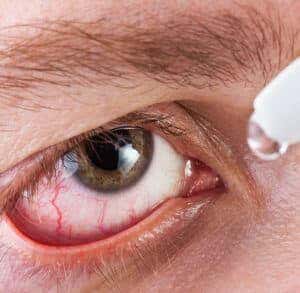
It may seem like a minor annoyance to someone who doesn’t experience this symptom. But just ask anyone who suffers from dry eyes what it feels like and you will hear some serious woe and misery.
Imagine sandpaper under your eyelids. If you have ever gotten a foreign object in your eye you know how distressing that can feel until you get it out. Now consider what it would be like if you could not remove it and instead had a constant gritty, burning, scratching or stinging sensation that never goes away.
What Causes Dry Eyes?
This incredibly unpleasant condition can be caused by a number of things. Dry eyes can be triggered by reduced tear production or increased evaporation from the surface of the eye. In some people the immune system attacks the tear glands just as it destroys other body tissue. This can lead to dry eyes in rheumatoid arthritis, lupus and Sjogren’s syndrome.
Conditions that reduce the cornea’s sensitivity reduce blinking and tear production, too. That is why diabetes, herpes eye infection and laser eye surgery (LASIK) may sometimes result in dry eyes. In certain cases, this reaction may be severe and can last for months or even years. This has a serious impact on quality of life and explains why some people may be dissatisfied with the outcome of their LASIK surgery.
Drugs Can Also Contribute to Dry Eyes:
Physicians and pharmacists rarely mention dry eyes as a drug side effect. That may be because it doesn’t seem like such a big deal, especially compared to serious side effects like liver or kidney damage, heart attack or stroke. But just ask someone with dry eyes how it affects their quality of life, and you will quickly learn that this is not a minor complication. What’s more, treating drug-induced dry eyes with eye drops might be a little like trying to slake your thirst in the middle of the desert with an eye dropper of water. Such a drip-by-drip solution is unlikely to alleviate the problem.
There are various ways that medications contribute to dry eye syndrome. A surprising number of drugs have what is referred to as anticholinergic activity. That means they affect the way the neurochemical acetylcholine interacts with receptors in the body. Such drugs can cause both a dry mouth and dry eyes by interfering with glands in these organs. A surprisingly large number of drugs have the potential to trigger this complication. A review article in the Journal of Ophthalmology (online, Aug. 27, 2012) lists many such drugs and discusses this topic in detail. They point out that the more medications a person is taking, the greater the likelihood that a combination could contribute to dry eyes.
Some Drugs That May Induce Dry Eyes
- Atenolol
- Atropine
- Brompheniramine
- Carvedilol
- Cetirizine
- Cetuximab
- Chlorothiazide
- Chlorpheniramine
- Chlorpromazine
- Citalopram
- Clemastine
- Clonidine
- Cyclophosphamide
- Cyproheptadine
- Desloratadine
- Diphenhydramine
- Doxazosin
- Doxylamine
- Eye drop preservative (benzalkonium chloride)
- Fesoterodine
- Fexofenadine
- Fluoxetine
- Fluphenazine
- Fluvoxamine
- Furosemide
- Homatropine
- Hydrochlorothiazide
- Hyoscine
- Ibuprofen
- Indapamide
- Interferon
- Ipratropium
- Isotretinoin
- Labetalol
- Lithium
- Lithium
- Loratadine
- Metoprolol
- Nadolol
- Naphazoline
- Oxprenolol
- Oxybutynin
- Paroxetine
- Pindolol
- Prazosin
- Primidone
- Prochlorperazine
- Propranolol
- Quetiapine
- Sertraline
- Tamsulosin
- Terazosin
- Thioridazine
- Timolol (topical)
- Tolterodine
- Tripelennamine
- Tropicamide
- Vinblastine
Recent case reports suggest that herbal medicines may also be responsible for severe dry eyes (Oh et al, Clinical and Molecular Hepatology, Sep. 2013). So may novel psychoactive substances such as synthetic opioids (Helander et al, British Journal of Dermatology, April 2017).
We NEVER suggest that a patient stop taking a medication without first checking with the prescriber. Some of these medications are essential for good health. But if someone is suffering from drug-induced dry eyes (or dry mouth), it is absolutely essential that this information be communicated to a physician to see if an alternative medication might not be appropriate that would not cause this adverse reaction.
Share your own story about dry eyes below. If you have found a solution, please share your success story with others. If a medication contributed to your symptoms, we would like to learn about that as well.
Revised May 10, 2018

